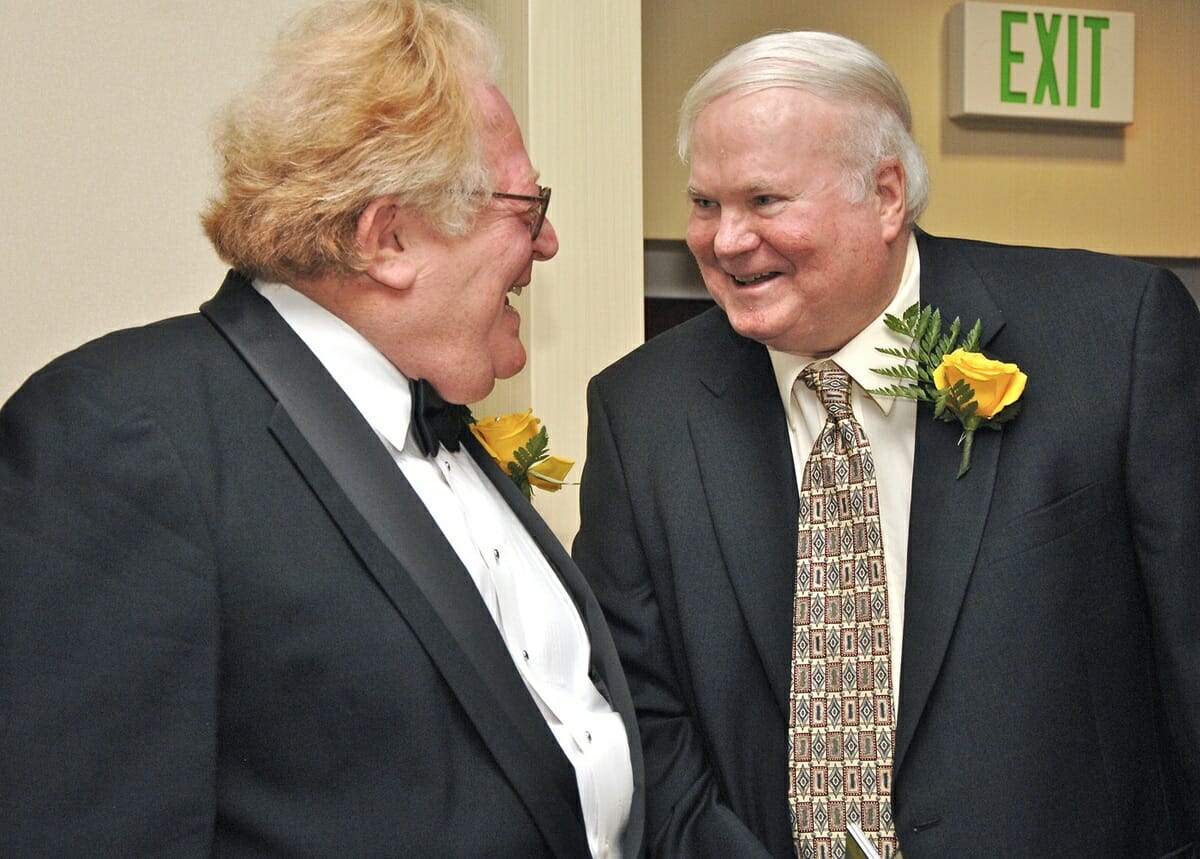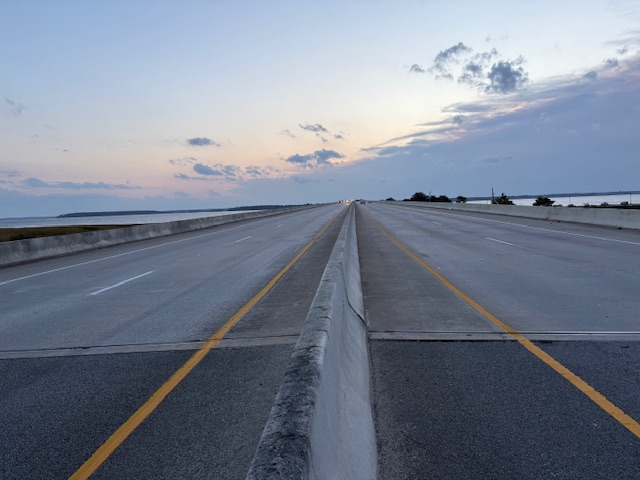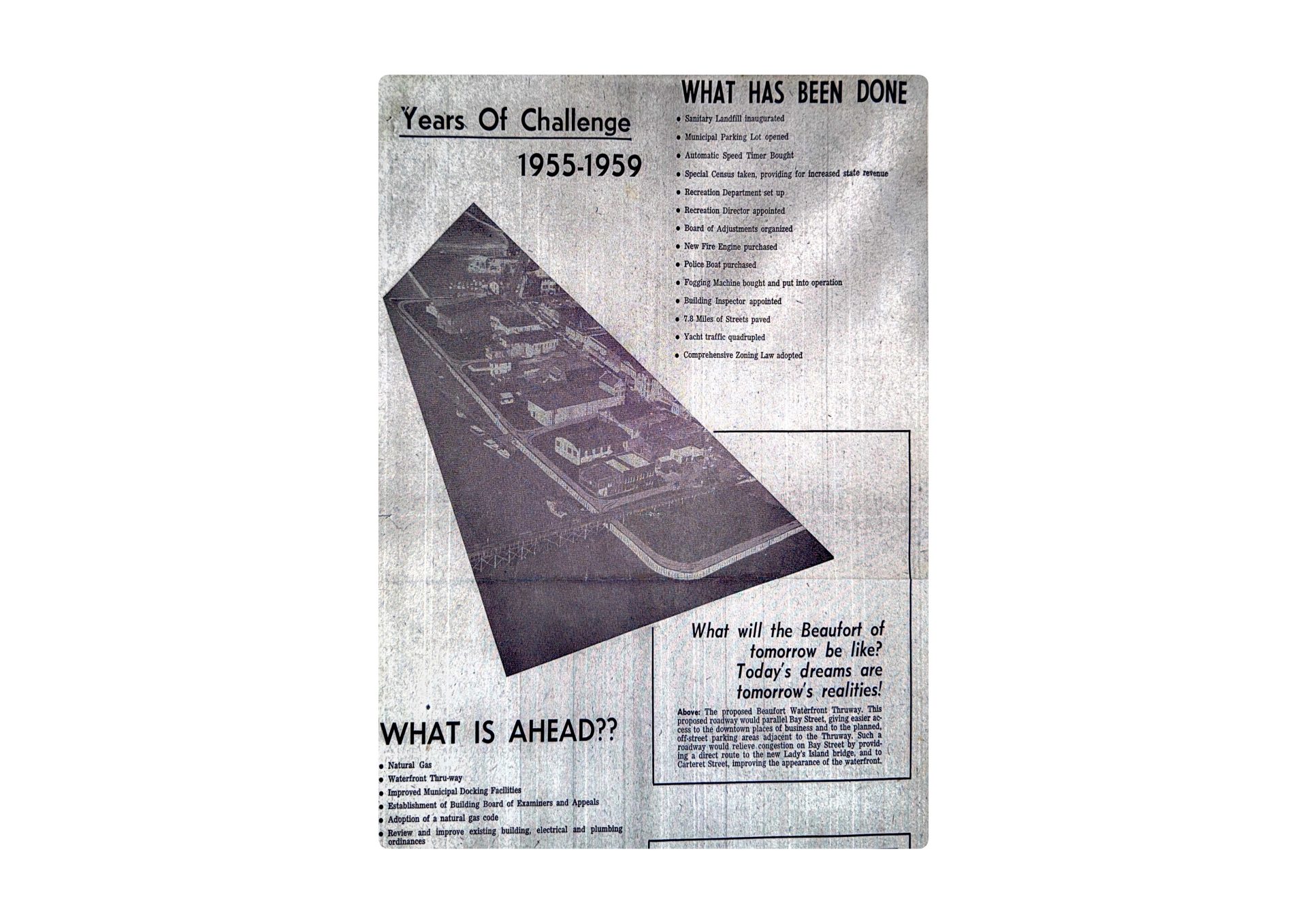Photo above: Beaufort Mayor Billy Keyserling, left, and Pat Conroy. Photo by Bob Sofaly.
By Bill Rauch
With the passing of Pat Conroy this week the Lowcountry lost a good and talented friend. Pat used his storytelling gifts to describe, in unique and memorable ways, the bountiful physical gifts that are singularly provided to us here, and we are better for that. But it was his intuitive sense of people — their conflicting motivations, their craziness and his courage to describe them honestly — that marked his genius.
He explained us to us.
The Island Packet’s David Lauderdale wrote a very nice daily newspaper-style tribute to Pat that appeared over the weekend. In the piece Lauderdale exhumed a quote from The Beaufort Gazette’s morgue in which Pat graphically expressed his displeasure with the proposed 2006 Clarendon Farms annexation by the City of Beaufort. The annexation occurred when I was mayor and Pat’s attack was directly upon me for, he said, loving real estate developers more than I loved Beaufort.
When fighting the illness that finally took his life Pat said he wanted to continue to live because he had more books to write. I understand fully. A part of one of those books might very well have been the Clarendon Farms story. When you knew the players the whole thing was plenty crazy, convoluted and conflicted enough to fit in a Conroy novel.
Just for starters, at the end of the endless 2006 public hearing on the annexation and development agreement, as I was about to cast as “Aye” my swing vote to permit more houses at Grays Hill than existed in all of present day Beaufort, I said: “It may seem inconceivable now, but my vote is a vote for conservation.” Look it up. Thankfully The Gazette ran the quote exactly.
Things got so nuts that evening after the 3-2 “Aye” vote that Police Chief Jeff Dowling insisted I be protected by the police as I turned out the lights in the hearing room. Most people thought what I really needed were the men in the white coats.
I was doing what I knew was right for Beaufort. And I knew I would pay a huge price for it.
Here’s how it happened.
In the midst of the craziness of the 2004-7 real estate bubble, an attorney came to the city representing Cox Enterprises, the owners of Clarendon Farms in Grays Hill. Clarendon was contiguous to the city limits and the attorney said its owners wanted to bring their land into the city with new zoning and a development agreement that would permit about 14,000 rooftops on the farm’s approximately 2500 acres.
If you knew the players, you knew how it would go down. Jim Kennedy, the CEO of Cox Enterprises, was in charge of his family’s interests with respect to the deal. Under Kennedy’s leadership Cox had caused nearly a hundred miles of hiker-biker trails to be built in Atlanta, the company’s headquarters town. A committed conservationist, he had overseen the protection of thousands of acres of his family’s land, and as a board member of Ducks Unlimited and the Wetlands America Trust he had preserved countless tens of thousands more acres.
Luckily, and importantly, I knew Jim Kennedy and I knew his conservation background. Seeing the storm coming, I said to him: “If we take you in, I know you’ll be a good citizen.”
Meanwhile, as the final vote approached mayhem ensued. My family was split with one brother-in-law insisting I vote “no” while another one was equally insistent I vote “yes.” The letters to the editor, including Pat’s, and the editorials were running 100-0 against the deal. Although their leaders knew Clarendon would ultimately go green, the major local environmental group that I had helped bring to Beaufort ran a 24/7 campaign against the deal to help make their 2006 fundraising target. Even Hank Johnson, the Mayor of Bluffton who annexed half of southern Beaufort County called me up to say, “If you actually vote “yes” on that, you’re through.”
But here’s what I knew. When Clarendon goes into deed restriction it will be the best thing that ever happened to MCAS Beaufort, Beaufort’s largest employer, because future encroachment of the airfield will be vastly limited. Also, the Air Station and a forever green Clarendon together will create a green buffer on the Whale Branch side of Beaufort that will stop the march of commercialization at Laurel Bay Road, thus preserving as “country” the great Lobeco/Whale Branch/Grays Hill entrance to one of America’s great small cities. Two years after the vote the Northern Area Plan formalized this boundary, and now a decade later it is stronger than ever.
If Cox Enterprises benefited, great, … so long as it was good for Beaufort.
Oh, the fun Pat would have had with the characters: the hypocritical environmental group boss and his legions of blind loyalists, the brothers-in-law…and their then-wives, the Operation Jackpot veteran turned crack land use lawyer, the callous Yankee mayor in cahoots with his greedy CEO buddy and, yes, the celebrity author who storms into the controversy with both barrels blazing.
And then there’s the ending: all 100% true.
Without Good Citizen Cox Enterprises there wouldn’t be three thousand all-green acres in perpetuity next to the Air Station that together form an important green belt on Beaufort’s outskirts; without Cox Beaufort’s largest employer would face ongoing and escalating encroachment issues; without Cox the trailer parks in Grays Hill would still be the drug-dealing capitals of Beaufort County; and without Good Citizen Cox Enterprises there would be no Spanish Moss Trail where we all now — oblivious to its origins — safely walk, run, bike and visit together.





